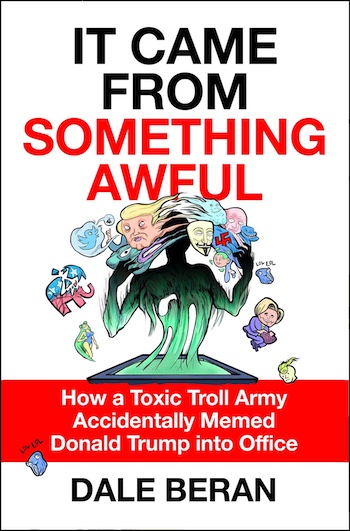I don’t write about books often, and usually I stick to good ones, but I feel this needs to be said: “It Came From Something Awful” is a book that, at minimum, needed more fact-checking before publication.

Though the book came out in 2019, author Dale Beran is back in the spotlight because of the January 6, 2021 storming of the U.S. Capitol. Beran is seen as one of the experts on 4chan, and 4chan is seen as a key origin point of What Just Happened ™.
As a result of this attention, Beran popped up on multiple podcasts that I like. I enjoyed what seemed to be his central argument: that “chans” (image-sharing websites) in both the U.S. and Japan produced similar cultures of isolated, nihilistic men who were easy pickings for fascist recruitment.
When I dug into the book, I found out this argument represents the first third of it at most, and my problems with the latter chapters make me call the whole thing into question.
It came from where?
I have a personal connection to some of the subject matter in the book. My involvement with the Occupy movement brought me into close contact with a number of activists in the Anonymous hacktivist space, during that time when 4chan spawned a group of ‘trolls for justice.’
Going back further, in my early 20s I actually participated in the Something Awful forums, the chaotic and frequently problematic humor site. I met some good friends there, found a job there and, eventually through a coworker at that job, made my way to the Texas regional Burning Man community. That pretty much ended any lingering interest I had in being a Something Awful ‘goon.’
As a young queer person with a history of left-wing views, I was probably never in danger of joining 4chan or becoming a white supremacist troll. But I experienced the early days of this weird and eventually, very destructive online culture. The author was also a member of the forums.
“It Came From Something Awful” isn’t really about Something Awful, however. Beran interviews Rich “Lowtax” Kyanka, founder of the site, but spends very little time on it and the meme cultures birthed there. He’s in such a hurry to get to 4chan that the actual history of Something Awful gets way too little attention (at least to this former goon). But the other sins of this book are much worse.
There’s no excuse to deadname, Dale
The whistleblower Chelsea Manning began to publicly transition in 2014. So why does a book published in 2019 use her deadname?
Deadnaming is the practice of referring to a transgender individual by their discarded birth name, or any former name they used before transitioning. It can be complicated for journalists to handle the initial transition of a famous person, but even then most LGBTQIA+ folks argue there’s no excuse for deadnaming.
Even the Associated Press, which is generally slow to get with the times, recommends using a deadname “only if relevant to the story.” So how is Chelsea’s transition relevant to her whistleblowing, and its influence on Anonymous? It isn’t. Her transition isn’t relevant at all, six years after it happened. Everyone knows who she is at this point.
Weirdly, “It Came From Something Awful” later refers to Caitlyn Jenner without deadnaming her. What gives?
It came from … Philadelphia?
“Bloc is a tactic, not an organization, a uniform or an identity.”
Garrison Davis, “Uprising” podcast episode 10
Beyond telling the early history of 4chan, its conversion to right-wing fascism, and the birth of QAnon, Beran argues that the last few years of upheaval in this country (and internationally) represent a grand culture war between 4chan and Tumblr.
I’ve got some serious issues with his arguments I’ll get into below, but it’s here that more and more obvious (to me anyway) factual errors start to creep in. This might be because I know some of the topics better.
Some of Beran’s worst writing comes when he’s discussing antifascist and antiracist activists. He seems to have done very little actual research into the topic and, if the book had a fact checker at all, they must have been equally ignorant. Here’s how he describes Richard Spencer getting punched in January 2017:
“… Spencer looked down, eager to explain his [Pepe] pin’s significance, when a member of antifa leapt into the frame and landed two quick sucker punches in quick succession.
The footage became a training video introducing citizens to the combatants in the new conflicts of 2017, the previously obscure anti-fascist group antifa (in this case, a Philadelphia chapter called the black bloc) and a new breed of frog-worshiping internet Nazis …”
“It Came From Something Awful,” Dale Beran
Wait, what??
Where to begin? I’ve written before about common misconceptions about black bloc. You can also simply refer to the Garrison Davis quote at the top of this section. Dressing up all in black for a protest is a tactic, and doesn’t imply membership in any particular organization. From Philadelphia or anywhere else.
Not all users of black bloc are antifascists. Even fascists have sometimes stolen the tactic. The tactic itself does not originate from Philadelphia, or even the United States. When black bloc tactics made their way from the autonomous movements in Europe to the anti-globalization movements of the late 90s and early 2000s, they first appeared in other cities like Seattle.
Further, the person who punched Richard Spencer has never been identified. We don’t know their place of origin, their name, or group affiliation if any. And antifa isn’t a specific group, either, certainly not one with well-defined “chapters,” as if it were the Moose Lodge.
Antifa is actually just short for antifascist. There are variations in tactics, but the idea that most “antifa” are the nazi punchers on the front lines is as ignorant as claiming black bloc is from Philly. Most of the work antifa do actually takes place quietly. It’s tracking Nazis, figuring out who they are, where they live and where they work and warning the communities that they endanger.
The problem with culture wars
I never got the feeling that the author agrees with the extremists, but he also twists facts to fit a sort of “both sides” narrative. Infected by Tumblr culture, he imagines colleges full of easily offended kids demanding safe space and trigger warnings on everything. While there’s a germ of truth to some, other parts stem from the same overblown, isolated incidents that the right-wing misuses to work themselves into a lather.
When he writes about antifa or Tumblr, it starts to feel like Beran’s primary sources were Fox News and 4chan. That’s the problem with Beran buying into this particular version of the modern “culture wars” — it seems all but impossible to write about them without laundering some right-wing talking points about kids these days. You can hear the echoes of white supremacy and its adherents’ imagined “war for Western civilization.”
Young people are often extremely passionate. Sometimes they’re wrong. Sometimes they’re right and go about things in the wrong ways. Often, it’s a mixture of the two (just like older adults).
‘It Came From Something Awful’ falls apart at the end
“It Came From Something Awful” paints Tumblr in extremely broad strokes, to say the least. I’ll grant that the users of Tumblr influenced modern culture. But unlike 4chan where almost everyone remains anonymous, users on Tumblr have distinctive names and identities. Specific people created and contributed to the Leftist movements that came out of social media, and Beran doesn’t really name any of them or bother drilling down.
The Richard Spencer punching incident gets described near the end of the book. Just a couple chapters from the end. I’ll confess that’s where I quit reading. It was the second time I put the book down, and I just can’t make myself try for a third.
I’m going to give Beran the benefit of the doubt that he knows what he’s talking about when it comes to the ‘chans. If he’d kept his focus on what he knows well, or had a stronger editor or fact-checker to call his flights of fancy into question, maybe “It Came From Something Awful” would have been an awfully good book.
As written, it’s an awful mess.
Published under a Creative Commons license
 ‘It Came From Something Awful’ Isn’t A Good Book’It Came From Something Awful’ Isn’t A Good Book by Kit O’Connell is licensed under a Creative Commons Attribution 4.0 International License.
‘It Came From Something Awful’ Isn’t A Good Book’It Came From Something Awful’ Isn’t A Good Book by Kit O’Connell is licensed under a Creative Commons Attribution 4.0 International License.Based on a work at https://kitoconnell.com/2021/05/06/it-came-from-something-awful-bad-book/.
Feel free to share and republish this, but give me credit (and a link back whenever possible).
Kit’s patrons made this post possible. One generous anonymous sponsor asks that you support Austin Pets Alive! Donate, volunteer, and consider them for pet adoptions.
